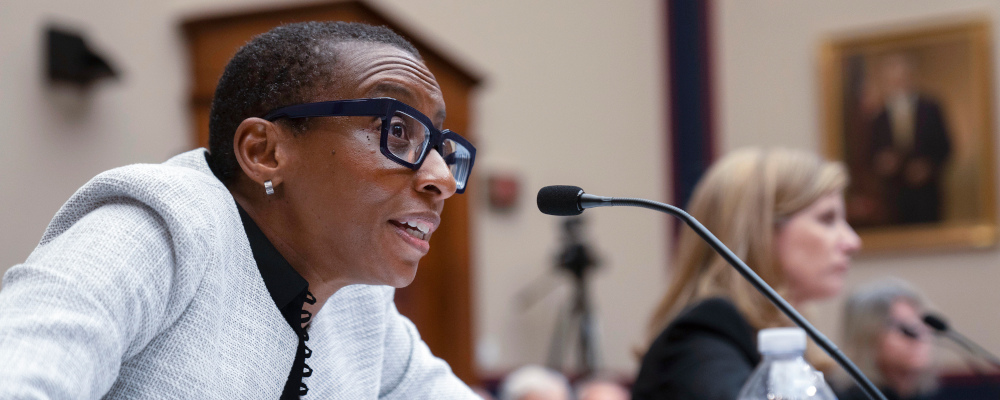Over the weekend, Penn University president, Liz Magill, resigned due to the fallout from her high-profile congressional testimony about anti-semitism on campus. The two other presidents, Claudine Gay of Harvard and Sally Kornbluth of M.I.T., who appeared alongside her, are facing similar backlashes but as of now remain in their posts.
Their refusal to state unequivocally that calls for the genocide of the Jews wouldn’t be tolerated on their campuses provoked such a strong reaction for three chief reasons: (1) the inherent double standard in the application of free speech protections, (2) a lack of a recognizable moral framework on the part of the university leadership, and (3) the growing monopoly that radical ideas now seemingly hold over post-secondary institutions.
One gets the sense that the personal consequences for the three presidents won’t be the end of this story. Their disastrous testimonies have been characterized as a “tipping point moment” in which new questions are being asked about the mission, purpose, and state of modern university education.
By coincidence, I recently wrote for The Hub about these same questions in the Canadian context, including whether we ought to eliminate tuition subsidies for domestic university students. The article received more reaction in general and more criticism in particular than my typical writing.
Some of the criticism has been constructive. One reader, for instance, noted that possible changes to tuition subsidies would require more careful thinking about the treatment between undergraduate and graduate education, the effects on different universities and the potential for rationalization and even consolidation within the sector, and the risks to Canada’s standing in the global competition for talent.
Others, however, seem to have mostly reacted to my conclusions without seriously engaging with the essay’s arguments. The case for rethinking tuition subsidies was dismissed as elitist or an emotional reaction to recent evidence of campus radicalism.
Yet the article wasn’t an act of provocation. It wasn’t written as “clickbait.” It was instead a first-principles attempt to reckon with whether our pre-existing assumptions about tuition subsidies for university students can still withstand policy scrutiny. My conclusion was that the case is weaker than most people—including evidently those in and around the university sector itself—seem to take for granted.
It doesn’t mean of course that any major policy reforms to the status quo wouldn’t be complicated or involve tradeoffs, or even that public funding for post-secondary education and research ought to be eliminated altogether. But the inability of many university voices to substantively respond to wonky policy arguments strikes me as evidence of an entitlement mentality and a bad sign for the sector’s capacity to defend itself in the face of a less hospitable political environment.
In the essay, I set out three arguments in favour of revisiting the current policy of subsidized tuition rates. It’s worth restating them and responding to the criticisms here.
- Subsidized tuition rates are regressive
Subsidized tuition fees for every university student regardless of his or her financial circumstances are an inefficient means to achieve the egalitarian goal of broad-based university access. It would be more efficient and equitable to permit tuition fees to rise in order to better reflect the true cost of university education and then subsidize low-income students with enriched means-tested grants.
Post-secondary policy expert Alex Usher has previously made similar arguments in favour of the better targeting of direct university subsidies. There’s a logic to adopting the same policy treatment of the indirect subsidies embedded in tuition rates for everyone—particularly since, as I outlined in my essay, they may in some cases exceed current tuition rates themselves.
It’s worth observing that the approach proposed here conflicts with the Ford government’s policy decision to cut and cap tuition rates in Ontario which has had the effect of increasing indirect subsidies to students. Most university voices were rightly critical of the government’s decision at the time. Many of the same arguments apply to the regressive subsidies reflected in ongoing tuition rates across the country.
Following the same advice here would manifestly lead to higher tuition rates for some students. But it wouldn’t necessarily harm the system’s overall progressivity—in fact, if the tuition hikes were matched by an increase in means-tested grants, it could actually have progressive effects.
A separate yet related outcome is that it would in theory encourage students to have a much greater stake in the cost and quality of their university education. They would be more intentional about their own educational choices and experiences. They would also presumably be more prepared to hold university administrations accountable for superfluous spending (such as growing DEI bureaucracies) that drives up costs but fails to improve the student experience. The net result might be that lowering or eliminating tuition subsidies could have anti-inflationary effects on the university sector’s inherent growth bias.
2. Individual benefits versus broad-based ones
The assumption that university education produces positive externalities underestimates the individual gains for university graduates and overestimates the broader societal benefits. The point here of course isn’t that universities fail to produce positive outcomes. It’s that they’re really quite good for individual graduates who generally receive a significant earnings premium but the evidence that they produce positive spillovers for the broader society is a bit more complicated.
There’s competing research on the subject and even then the scholarship tends to study universities as a whole rather than distinguish between programs or fields of study. Disaggregating different types of university education and research would presumably show that certain programs produce positive spillovers and others produce fewer or none at all.
An alternative to eliminating tuition subsidies altogether therefore might be to estimate the externalities of different programs and set tuition subsidies accordingly. Taxpayers could subsidize programs that produce broad benefits and students would be required to pay the full cost of programs that do not.
Although such a policy reform would undoubtedly be controversial, the first-principles argument is reasonably strong. It would better root public subsidies in a rationally-connected policy principle and create a market mechanism for the kinds of education and research that may interest individuals but produce no demonstrable benefits in the broad public interest.
3. Democratic accountability for universities
The thorniest issue is the growing disconnect between the ideas and languages of universities and the rest of society. The rise of decolonialization, intersectionality, and other critical theories has led a lot of university education and research in increasingly narrow, radical, and unrepresentative directions.
Critics dismissed these concerns as nothing more than a “handful of ‘outrageous’ examples” or a small issue “happening at a half-dozen universities.” This strikes me as a serious lack of introspection and self-awareness on the part of the sector and its proponents. The rise of campus radicalism has been well-documented across the Anglosphere, including by Canadian-British scholar Eric Kaufmann who recently left the University of London College because of these trends.
One just needs to survey the academic job postings over the past several years. There’s been a clear tilt in the direction of highly-politicized campuses. The problem isn’t just that the universities are monolithically left wing. It’s the disproportionate influence that radical ideas have assumed over admissions, hiring, grant funding, and journal publications.

We’ve directly witnessed the consequences over the past several weeks here in Canada in the form of acts of intimidation and protests on campus that have selectively targeted Israel for opprobrium and sought to justify or rationalize Hamas’s horrific attacks. Universities have been at the epicenter of antisemitism across the country.
It’s reminder that we shouldn’t be too smug about last week’s congressional testimonies by Gay, Kornbluth, and Magill. Their refusal to say that calling for the genocide of Jews contravenes their schools’ codes of conduct is outrageous and certainly worthy of the criticism that they’ve faced. But as private institutions that rely primarily on non-public funding, the responsibility for what happens on campus ultimately lies with those who pay for and run these institutions within the context of the law.
What distinguishes the experience in Canada is that universities are heavily subsidized by taxpayers. Governments dedicate roughly $20 billion to university education and research each year. This isn’t an insignificant amount. It’s nearly the same level of public expenditure as national defence.
The key difference here is that private universities are subject to certain market mechanisms. Board members, donors, faculty, and students can opt out of particular institutions or even the private system altogether if they believe that the culture, pedagogy, or ideas are unhealthy and bad. We don’t have that option in a publicly funded system. Canadian taxpayers are expected to subsidize public universities without any voice over the education and research that’s carried out using their resources and in their name.
Herein lies the tension: university administrators and faculty members want it both ways—they want taxpayer funding but they don’t want taxpayers to have a say about what happens on campus. As I outlined in my essay, one cannot help but think that this is no longer a sustainable arrangement.
What taxpayers have witnessed over the past several weeks is bound to lead to growing demands for greater democratic accountability. Something will likely need to give. Universities may have to accept a greater democratic role in their administration and allocation of resources or move to a more market-based model in which tuition fees and other own-source revenues come to represent a larger share of their budgets. An expectation of ongoing public funding with no strings attached is no longer a safe bet for university leaders.
Opening up universities to greater democratic accountability comes with legitimate problems as University of British Columbia law professor Camden Hutchison set out in his essay for The Hub. The alternative therefore to reduce the extent to which universities are dependent on taxpayers represents a better option. It could enhance progressivity within the system, better align the benefits and costs of university education, and solve the growing tension between academic freedom and democratic accountability.
Even if critics disagree, they’d be prudent to take these issues far more seriously. In light of long-term fiscal sustainability challenges facing several provinces, public spending on universities was already bound to face greater scrutiny in the coming years. The public’s exposure to campus radicalism over the past several weeks is likely to only reinforce such questions.
A response of derision and entitlement isn’t in the interests of Canada’s universities. All it will do is hasten their inevitable confrontation with politics. And, as Gay, Kornbluth, and Magill learned, they probably won’t like the outcome.




